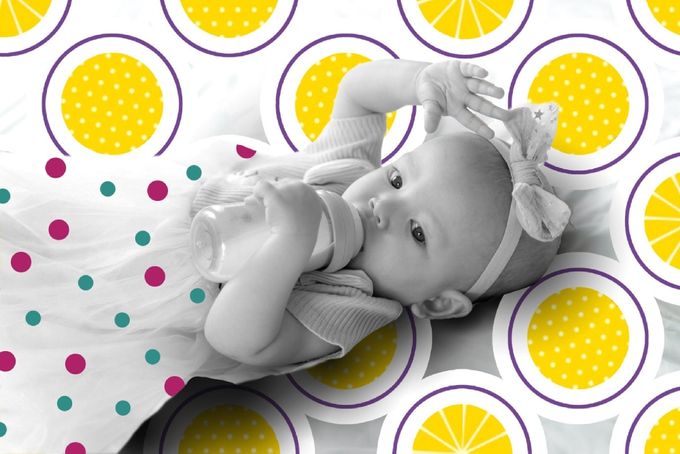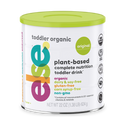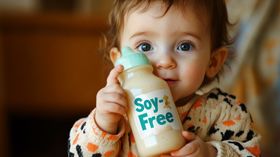Is Soy-Free Formula Good For Babies?
Understand the risks of soy-based formulas and discover healthier, soy-free alternatives to nourish your child.
Updated September 27, 2024

Many families choose a dairy-free lifestyle for various reasons, including allergies, ethical concerns, or simply personal preferences. While soy-based formula has often been a popular alternative, recent research has raised questions about its suitability for all babies. [1]
Luckily, a dairy-free lifestyle doesn't have to compromise your child's nutrition. This guide will explore the potential risks of soy-based formulas and offer safer alternatives to ensure your child receives the essential nutrients they need.
» Don't compromise your child's health. Discover the benefits of soy-free baby formula
What Is Soy-Free Formula?
Soy-free formula is a type of baby formula that doesn't contain any soy protein or soybean oil. These formulas typically derive their nutrients from other sources, which can include:
- Animal milk—such as cow's milk or goat's milk
- Other plant-based proteins—like pea, rice, almond, or rice protein
- Specialized ingredients—such as hydrolyzed proteins for babies with allergies
The key is that these formulas provide all the necessary nutrients for a baby's growth and development without relying on soy as a primary ingredient.
» Explore healthy ways to supplement breastfeeding with formula
Is Soy Bad for Babies?
Soy isn't inherently "bad." It's been a staple in many cultures for thousands of years and offers several potential health benefits:
- Complete Protein: Soy is one of the few plant-based complete proteins, containing all nine essential amino acids the body can't produce on its own.
- Heart Health: The FDA has approved a health claim stating that 25 grams of soy protein per day may reduce the risk of heart disease. [2]
- Nutrient-Rich: Soy is a good source of fiber, B vitamins, and minerals like iron, calcium, and zinc.
- Lactose-Free: For babies with lactose intolerance, soy-based formulas can provide a nutritious alternative to cow's milk formulas.
» Understand the benefits of vitamin D and calcium for kids
The Case Against Soy in Baby Formula
Despite its benefits, soy-based formulas have faced scrutiny. Some concerns associated with these formulas include:
- Phytoestrogen Content: Soy contains high levels of isoflavones, a type of phytoestrogen that can mimic estrogen in the body. Some studies suggest early exposure to these compounds might affect hormonal development, especially in male infants. [3]
- Allergenic Potential: Soy is one of the eight most common food allergens. Up to 14% of infants with cow's milk allergies may also react to soy proteins. [4]
- Digestive Issues: Many infants experience difficulty digesting soy proteins, which can lead to various gastrointestinal problems such as gas, bloating, and constipation.
- Nutrient Absorption Concerns: Soy contains compounds like phytic acid that can interfere with absorbing essential minerals such as iron, zinc, and calcium.
- GMO and Pesticide Exposure: Most soy crops are genetically modified and heavily treated with pesticides, raising concerns about long-term impacts and exposure to residues.
- High Sugar Content: Many soy formulas rely on added sugars, particularly corn syrup solids and sucrose, for necessary carbohydrates.
- Aluminum Levels: Studies have shown that soy formulas often contain higher aluminum levels than other options. [5]
» Find out how to safely introduce allergens to your baby
The Rise of Alternative Soy-Free Formulas
Recognizing the potential issues with soy-based formulas, many manufacturers have turned to alternative ingredients to create soy-free options. These alternatives aim to provide complete infant nutrition while avoiding the concerns associated with soy.
Almond-Based Formulas
Almond-based formulas offer several advantages:
- Rich in vitamin E, supporting immune function and skin health
- Contain healthy fats crucial for brain development
- Good sources of magnesium, manganese, and copper
- Often have a mild, slightly sweet taste that many babies find appealing
» Learn more about the benefits of almonds
Buckwheat-Based Formulas
Despite its name, buckwheat is not related to wheat and is actually a seed. Buckwheat-based formulas have several benefits:
- Gluten-free, making them excellent for babies with gluten sensitivities or celiac disease
- High in magnesium, copper, and manganese, supporting bone health and immune system development
- Contains rutin, an antioxidant that may help protect against cellular damage
- Provides all essential amino acids
» Check out our simple guide to gluten sensitivities and allergies
Tapioca-Based Formulas
Tapioca, derived from cassava root, is another promising ingredient in soy-free formulas:
- Easy to digest, gentle on a baby's developing digestive system
- Hypoallergenic, reducing the risk of allergic reactions
- Good energy source, providing carbohydrates for energy
- Mild flavor, making it an excellent base for formula
» Learn more about food allergies in babies and what you can do about it
Rice-Based Formulas
These have been a popular choice for parents seeking soy-free and dairy-free alternatives:
- One of the least allergenic foods, suitable for babies with multiple food sensitivities
- Generally easier for babies to digest compared to cow's milk or soy proteins
- Nutritionally fortified to meet babies' needs
- Naturally mild taste that many babies find palatable
Note: Rice cereal may contain arsenic. Look for brands that test for low levels and ensure proper fortification to make up for its lower protein content.
» Worried about potential risks of rice-based baby food? Try these alternatives
Pea-Based Formulas
Pea protein has emerged as a popular plant-based protein source in baby formulas:
- High-quality complete protein containing all nine essential amino acids
- Naturally high in iron, essential for infants, particularly after six months
- Less likely to cause allergic reactions compared to soy or dairy proteins
- Environmentally friendly and sustainable crop
- Well-tolerated by many babies
Combination Formulas
Some manufacturers have developed products that combine multiple plant-based sources. For example, Else Nutrition offers a formula that consists of 75% almonds, 25% buckwheat, and tapioca.
This blend provides the benefits of multiple ingredients:
- Diverse Nutrient Sources: By combining different plant-based ingredients, your kid receives a wider range of nutrients found naturally in each source.
- Balanced Amino Acid Profile: The combination of proteins from different plants results in a more complete amino acid profile. This provides all the essential amino acids their bodies need but cannot produce on their own.
- Improved Taste and Texture: Mixing ingredients leads to a more palatable formula that babies find easier to accept.
- Reduced Risk of Single-Source Sensitivities: Using multiple ingredients may lower the risk of babies developing sensitivities to any single plant-based source.
» Learn more about how Else Nutrition's formula is made
Benefits of Soy-Free Alternatives
Formulas made from these alternatives have many advantages over soy-based options:
- Reduced Allergen Risk: These ingredients are generally less allergenic than soy.
- Better Digestibility: Many babies find these alternatives easier to digest.
- Diverse Nutrient Profile: Incorporating various plant-based ingredients often provides a more diverse array of nutrients.
- No Phytoestrogens: Unlike soy, these alternatives are free from phytoestrogens.
- Clean Ingredients: Many of these alternative formulas prioritize organic, non-GMO ingredients.
- Suitable for Special Diets: Some soy-free formulas cater to specific dietary needs, such as kosher or halal requirements.
- Nutritional Variety: These formulas often introduce babies to a wider range of nutrient sources.
» Discover how nutrition influences your child's immunity
How To Find The Best Soy-Free Formula
Choosing the right formula for your baby is a personal decision that depends on various factors:
- Talk to Your Doctor: Always discuss formula changes with your child's doctor.
- Your Baby's Age: Ensure the formula is appropriate for your baby's stage of development.
- Allergies or Sensitivities: Monitor your baby for any signs of allergic reactions or digestive issues.
- Slow Introduction: If you're switching formulas, do so gradually to let your baby's digestive system adjust.
- Read Labels: Understand all ingredients and their potential benefits or drawbacks.
- Lifestyle and Values: Choose a formula that aligns with your family's dietary preferences and ethical considerations.
» Discover our expert tips for finding the right formula for your baby
Nourishing Your Baby Naturally
As our understanding of infant nutrition evolves, so do the options available to parents. Soy-free formulas offer a promising alternative for families looking to avoid potential concerns associated with soy-based products while still providing complete nutrition for their babies.
Whether you choose an almond, buckwheat, tapioca, rice, or pea-based formula, the key is finding an option that works well for your baby's unique needs and preferences.
» Ensure your child receives the best nutrition with premium soy-free baby formula
The content and advice provided in this article is for informational purposes only and is not a substitute for medical diagnosis, treatment, advice for specific medical conditions. Always consult a pediatrician to understand the individual needs of your child.
References
[1] Y. Vandenplas et al., “Safety of soya-based infant formulas in children,” British Journal of Nutrition, vol. 111, no. 8, pp. 1340–1360, Feb. 2014, doi: 10.1017/s0007114513003942. Available: https://pubmed.ncbi.nlm.nih.gov/24507712/
[2] A. T. Girgih, S. B. Myrie, R. E. Aluko, and P. J. H. Jones, “Is category ‘A’ status assigned to soy protein and coronary heart disease risk reduction health claim by the United States Food and Drug Administration still justifiable?,” Trends in Food Science & Technology, vol. 30, no. 2, pp. 121–132, Jan. 2013, doi: 10.1016/j.tifs.2012.12.003. Available: https://www.sciencedirect.com/science/article/abs/pii/S092422441300006X#:~:text=In%201999%2C%20the%20United%20States,the%20risk%20of%20heart%20disease.
[3] E. C. Dinsdale and W. E. Ward, “Early exposure to soy isoflavones and Effects on reproductive Health: A review of human and animal studies,” Nutrients, vol. 2, no. 11, pp. 1156–1187, Nov. 2010, doi: 10.3390/nu2111156. Available: https://www.ncbi.nlm.nih.gov/pmc/articles/PMC3257624/
[4] R. S. Zeiger et al., “Soy allergy in infants and children with IgE-associated cow’s milk allergy,” The Journal of Pediatrics, vol. 134, no. 5, pp. 614–622, May 1999, doi: 10.1016/s0022-3476(99)70249-0. Available: https://www.sciencedirect.com/science/article/pii/S0022347699702490
[5] N. Chuchu, B. Patel, B. Sebastian, and C. Exley, “The aluminium content of infant formulas remains too high,” BMC Pediatrics, vol. 13, no. 1, Oct. 2013, doi: 10.1186/1471-2431-13-162. Available: https://www.ncbi.nlm.nih.gov/pmc/articles/PMC3851493/










